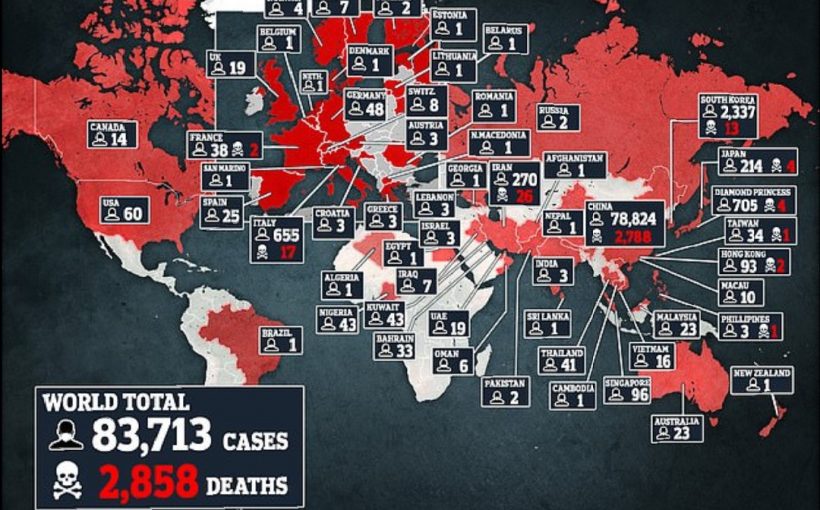A coronavirus is a type of virus which can cause illness in animals and people. Viruses break into cells inside their host and use them to reproduce itself and disrupt the body’s normal functions. Coronaviruses are named after the Latin word ‘corona’, which means crown, because they are encased by a spiked shell which resembles a royal crown.
A WHO spokesperson said the outbreak, which is teetering on the edge of becoming a pandemic, was ‘getting bigger’ and could well reach ‘all countries’.
The virus has now struck down 82,000 victims in 57 counties and killed almost 3,000 patients.
Europe was hit with an explosion in infections this week, with cases soaring from less than 40 to more than 800 in just seven days.
Christian Lindmeier, a spokesman for WHO, today told a news briefing in Geneva: ‘The outbreak is getting bigger.
‘The scenario of the coronavirus reaching multiple countries, if not all countries around the world, is something we have been looking at and warning against since quite a while.’
The stark warning comes a day after the global body said the world was in a ‘delicate situation’ and suggested the epidemic was at a tipping point.
Dr Tedros Adhanom Ghebreyesus, WHO’s director general, said: ‘This virus has pandemic potential. We are actually in a very delicate situation in which the outbreak can go in any direction based on how we handle it.’
Countries have been enforcing radically different containment strategies in a desperate scramble to contain the outbreak.
China has enforced some sort of travel restrictions on 700 million of its people to control the spread.
Some of the strictest measures can be found in four cities in Hubei province, the epicenter of the outbreak.
Residents in the region are on strict curfews and can only leave their homes a few times a week to buy food.
Elsewhere, Japan has closed its schools for at least a month, while Iran has canceled Friday Prayers in major cities and Saudi Arabia banned pilgrims from its holiest sites.
Switzerland has banned all events involving more than 1,000 people until at least March 15.
Nigeria also confirmed the first case of the virus in Sub-Saharan Africa on Friday, in a patient who had flown to the megacity of Lagos.
The country was among among several to confirm their first cases in recent hours including the likes of Estonia, Denmark, the Netherlands and Lithuania.
The majority of those countries reported the infection in a person who had travelled to Italy, including the first patient diagnosed in Mexico.
Meanwhile the first Briton to die from coronavirus was recorded today – a man who was on board the Diamond Princess cruise ship quarantined in Japan.
The man was among 78 Britons quarantined on the cruise liner which became one of the world’s largest clusters of virus cases.
Three more people have tested positive for coronavirus in the UK, bringing the total on home soil to 19.
Mainland China saw another sharp fall in its rate of infections today with 327 new cases, the lowest number since January, and 44 deaths.
China’s update brings the country’s total number of cases to 78,824 and deaths to 2,788.
Friday’s figure in mainland China was the lowest rise in new cases since January 24, when 259 new infections were reported.
The rate of deaths in China has also slowed, with yesterday’s fatality toll of 29 the lowest in nearly a month.
But infections in other countries are gathering pace, with the World Health Organization warning that the coronavirus epidemic was at a ‘decisive point’.
More than 3,600 infections have been reported outside mainland China, with 70 deaths.
Even China is now worried about importing cases and has ordered people arriving in Beijing from affected countries to go into a 14-day self-quarantine.
The coronavirus has appeared in several new countries in recent days – Brazil, Denmark, Estonia, Georgia, Greece, the Netherlands, Norway, Northern Macedonia, Pakistan and Romania – bringing the number of countries affected to more than 45.
The Swiss ban on ‘large-scale events involving more than 1,000 people’ will take effect immediately.
‘In the case of public or private events at which fewer than 1,000 people would gather, event organisers must carry out a risk assessment in conjunction with the competent [regional] authorities to decide whether or not the event can be held,’ authorities said.
Health minister Alain Berset said that similar measures had proved ‘effective’ in other countries.
The government said it was ‘aware that this measure will have a significant impact on public life in Switzerland’ but added that ‘it should prevent or delay the spread of the disease, thus reducing its momentum’.
The health minister told reporters that the number of cases in Switzerland was ‘not a surprise for us’, adding: ‘We have to expect an increase in cases in the next few days’.
The measure will affect the annual Geneva Motor Show, which was due to take place from March 5-15 and draws tens of thousands of visitors every year.
Football fixtures are also likely to be affected. The five teams due to play at home this weekend all had more than 1,000 spectators in their last home games.
Daily mail


